By Pastor Sam Jess, Barss Corner, Nova Scotia, Canada
I am an English-speaking Canadian. I’ve never been to Ukraine, and I do not speak Ukrainian or Russian. But when I was 17 years old I watched a tour video and I learned something fascinating about Ukraine that has stuck with me since. The traveler in the video spoke about the Chernobyl disaster, and his camera focused on a shrub that is common in the region around Chernobyl. The shrub is called wormwood, and has a bitter taste. The traveler quoted a prophecy from the Bible, about a disaster that was going to happen:
10 The third angel sounded his trumpet, and a great star, blazing like a torch, fell from the sky on a third of the rivers and on the springs of water— 11 the name of the star is Wormwood.[a] A third of the waters turned bitter, and many people died from the waters that had become bitter.
Revelation 8:10-11
I don’t remember how much the traveler pointed out the uncanny ways the Chernobyl disaster (April 26, 1986) resembles this prophecy. (I will review the similarities below.) But he made his point when he said,
“The Ukrainian word for Wormwood is ‘Chernobyl’.”
Now with war in Ukraine frequently on the news, people here in Canada have been asking me about the end of the world. So I decided to study about Chernobyl and Wormwood. The following is some of what I learned, and my conclusions.

Agnieszka Kwiecień, Nova, CC BY-SA 4.0, via Wikimedia Commons
Chernobyl and Wormwood
First, I learned that not many people in the English-speaking world have explored this question. It is not common to find it discussed in current books about end-times prophecies. US President Reagan referenced the prophecy, and the New York Times highlighted it in the year of the disaster. Then it seems like it was largely forgotten.
Why?
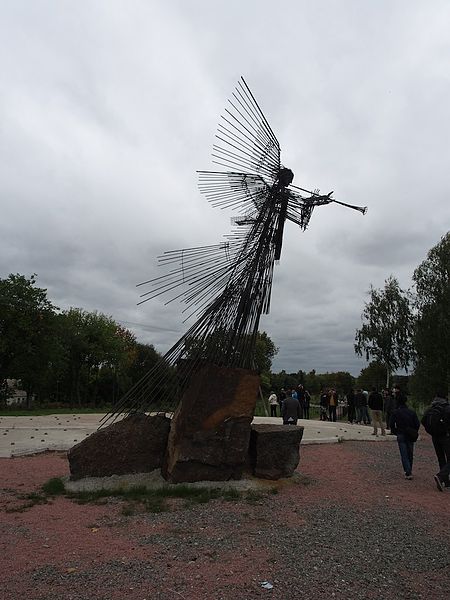
Clay Gilliland, CC BY-SA 2.0, via Wikimedia Commons
Maybe because it didn’t fit with how people pictured the end-times happening. For example, everyone was expecting nuclear disaster to come as an attack, not as an accident. Also, Bible-readers expected the “third trumpet” to happen within a sequence of other disasters within a 7-year period of “tribulation.”
Second, I learned that this prophecy has a prominent place in how many Ukrainians understand the Chernobyl disaster. Serhii Plokhy is a Ukrainian historian who was downwind from the disaster when it happened. He is a professor at Harvard University now. In his 2018 book, Chernobyl: The History of a Nuclear Catastrophe, he introduces the prophecy on p. 27 and returns to it at significant points throughout the book. I’ve read a couple of other books written by non-Ukrainians about the disaster, and they don’t mention the prophecy at all.
More prominent is the physical memorial constructed to mark the 25th anniversary of the disaster at the old town of Chernobyl. This features a stunning statue made of metal rods to look like an angel blowing a trumpet – the angel of the Wormwood Star.
Chernobyl and Bible Prophecy
All of this shows that it is worth our time to look carefully at
- what happened,
- how it lines up with the prophecy,
- how it does not line up with the prophecy, and
- how it should effect the way we believe and the way we live.
1. What happened?
At 1:27:58 AM on April 26, 1986, in the middle of a safety test on Reactor #4, the reactor went out of control and exploded. Radioactive material was scattered over a wide area. And then part of the core continued to burn hotter and hotter over the coming days and weeks, sending a steady plume of radioactive smoke over much of Europe. It took a surprisingly long time for the technicians at the plant to realize and acknowledge what had happened – such an explosion was supposed to be impossible. Top authorities were more concerned at first to get the generators generating again, than with the real issues. And for the few who got close enough to look down into the reactor, to see the nuclear fire, it cost them their health and their lives.
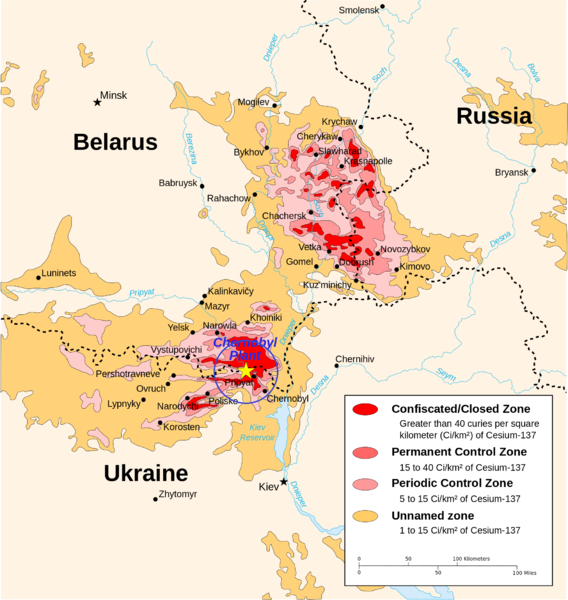
CIA Factbook, Sting (vectorisation), MTruch (English translation), Makeemlighter (English translation), 四葉亭四迷, CC BY-SA 2.5, via Wikimedia Commons
2. Uncanny connections to the prophecy:
A. The name. It was only after long deliberation that the nuclear plant was named after the administrative capital 13 km away, Chernobyl (or Chornobyl). That name refers to the bitter-tasting black shrub that grows abundantly there, a variety of wormwood. And so, a little bit indirectly but quite definitely, the nuclear power plant was named after the shrub, wormwood. The prophecy says the star would be called Wormwood. If you check a Russian or Ukrainian Bible, Rev. 8:11 will say “Polyn,” for “Wormwood,” not “Chernobyl.” Polyn is the more generic term for the shrub wormwood, while chernobyl is the local variety. The connection is direct enough, for locals who know the shrub.
B. The way it burned and burned. The prophecy says that it would “burn like a torch.” That is exactly what happened, giving an eerie coloured glow and a constant plume of smoke. By May 1 it seemed to have burned itself out, but then May 2 the temperature and the radiation levels began to rise sharply, and it risked either exploding again (but much worse than the first time) or burning through the floor and descending down into the water table. No one knew how long the burning could last. However, fortunately for the world, the graphite burned itself out on May 10.
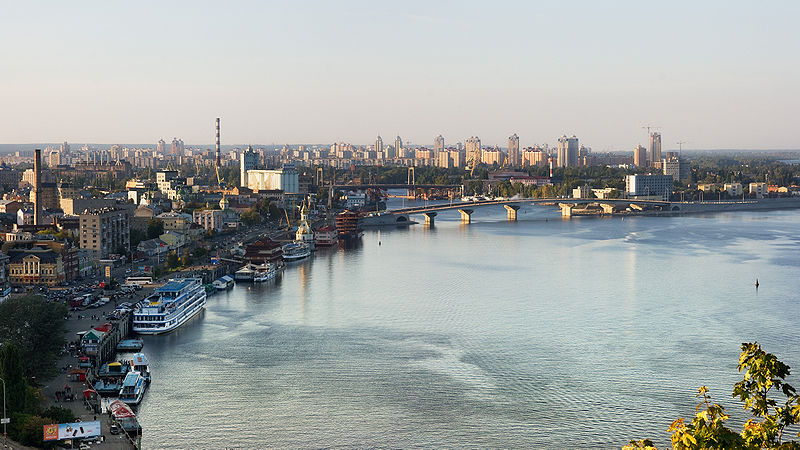
Dmitry A. Mottl, CC BY-SA 3.0, via Wikimedia Commons
C. Its prominent place on the waters. One of the drawbacks of building the plant at its site was that groundwater flowed very close to the surface. The nearby Dnieper river is “one of the largest surface water systems in Europe.” And a recent Hollywood movie frightened all the technicians regarding what would happen if the reactor burned its way down into the water table and poisoned all the water. The technicians took extreme measures to prevent anything like that.
D. It was not a star, but it was referred to as one, long before the accident. Nuclear power was Gorbachev’s hope for revitalizing a stagnant economy. Soviet authorities referred to these power plants as “stars” shining across the USSR. Also, the nuclear reaction they used was comparable to the nuclear reaction that powers stars. And at the time of the explosion, the heat in the reactor reached 4,650 degrees centigrade, almost exactly the temperature of the surface of the sun.
I admit that something doesn’t fit with the part of the prophecy about the star “falling from the sky.” But somehow it is worth mentioning that everyone was expecting nuclear war to come from the sky. They were talking about President Reagan’s “Star Wars” missile defense system. And after the accident, one of the reasons Soviet authorities were hesitant to welcome IAEA authorities was that they would see the nearby enormous radar array, the USSR’s principal way of watching for “stars falling from the sky” (nuclear missiles).
E. The timing of the crisis was such that it challenged people to wonder what they truly should celebrate. May Day (one of the two biggest holidays in the USSR) parades happened 5 days after the explosion, while Victory Day celebrations occurred on May 9. Meanwhile, people felt challenged to return to celebrating (Orthodox) Good Friday (May 2) and Easter (May 4) during the evacuations.

Alexxx1979, CC BY-SA 3.0, via Wikimedia Commons
3. Differences, that show it was not a complete fulfillment
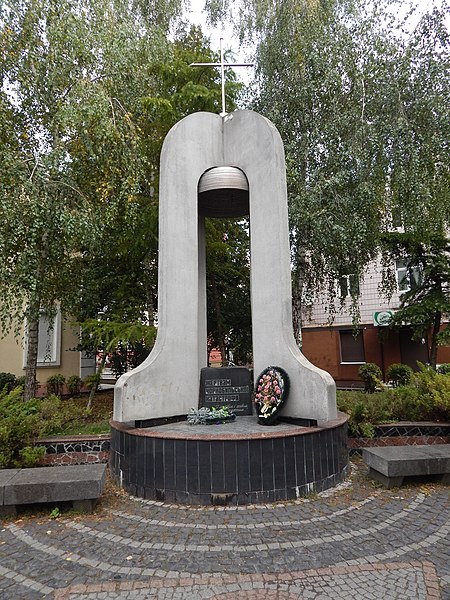
Venzz, CC BY-SA 4.0, via Wikimedia Commons
A. No bitter taste was reported in anything I read, aside from pills people took. The prophecy says that a third of the water will turn “bitter.” Yes, some water became poisoned (though not as much as could have been). But even the firefighter who drank out of the cooling ponds didn’t say it tasted bitter. People with radiation spoke about metallic tastes in their mouths, and someone mentioned a taste like sour apples. But never bitter. Moreover, the government effort to protect the groundwater and the river water was largely successful. If this was a complete fulfillment of the prophecy, then I think we would have had to ship huge amounts of drinking water into Europe for decades. That did not happen.
B. Deaths were surprisingly less than you would have expected, especially in the early days of the disaster. Certainly in the following months, years, and decades many, many people and families suffered terrible things because of the radiation, and many people died much younger than they should have. But the prophecy says that many people will die “from the waters.” That does not seem to fit exactly with what happened.
C. It doesn’t fit within a series of other disasters listed in Revelation 8. Of course, the world may have “missed” various details of things that have already happened, like how many of us “missed” the uncanny connections between Wormwood and the Chernobyl disaster. But that gets less likely when you have a list of 7 trumpets instead of just one.
Summary: I find it hard to dismiss these disasters as having nothing to do with this prophecy. I also find it hard to say that it was a complete fulfillment of this prophecy. It seems like if the meltdown had reached the groundwater, then it would have been more like a complete fulfillment. But it didn’t. It seems wisest to say that the Chernobyl disaster is some kind of partial fulfillment of this prophecy.
What is a “partial fulfillment” of a prophecy?
While we watch for signs of the end of the world, we need to learn from the Bible about how biblical prophecies come about. Sometimes they come all at once, like the sudden destruction of Sodom in Abram’s day. Or sometimes they come in one part, and then another part later.
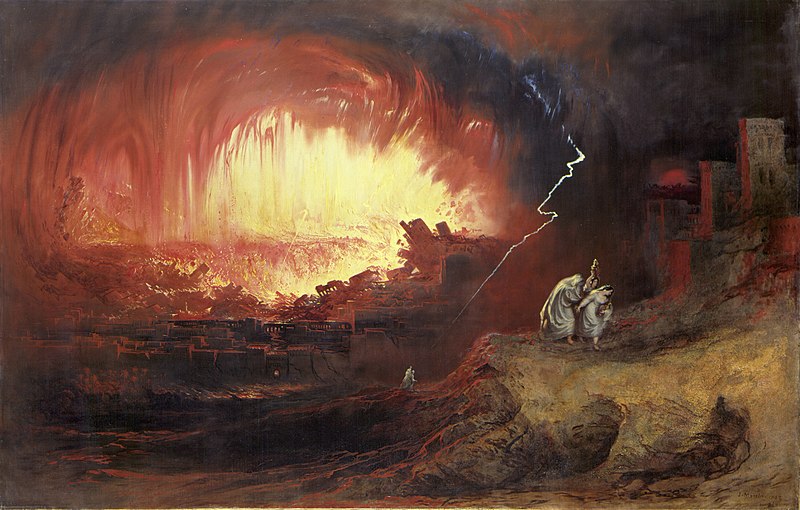
John Martin, PD-US-expired, via Wikimedia Commons
On Christ’s Day, many people thought they had the end times figured out. And then Christ didn’t fit with what they had figured out, so they missed embracing him as they should have. Even John the Baptist was like that: he had predicted that Christ would come with great destruction. And then Christ came with compassion. He struggled to see that Christ would come twice, not once, and that most of the destruction he predicted would be at the Second Coming. So he was confused by the partial fulfillment at the first coming.
I think that “partial fulfillments” of prophecy are fulfillments that yet allow us time to repent, fulfillments that come with more mercy than judgment.
I am not an expert on prophecy or the history of the Chernobyl disaster. But it seems to me that the Chernobyl disaster was a “partial fulfillment” of Rev. 8:10-11. God was merciful (and many people worked very hard) to hold back the more horrifying things that could very easily have happened. As we reflect on that, may we turn our lives to him in repentance?
4. The following are some lessons we can learn as we reflect on the Chernobyl disaster, and the mercy God showed us in it:
When it comes to watching for signs of the end, we need to be careful not to think we have it all figured out, how things are going to happen. Things can come from directions we don’t expect. No one expected that a nuclear disaster would come from human negligence, and civilian infrastructure, instead of from the sky, from war. And things can go in directions you don’t expect. No one would have expected this event to lead to an end of the Soviet Union as it did, and the peace that came from that, for a time.
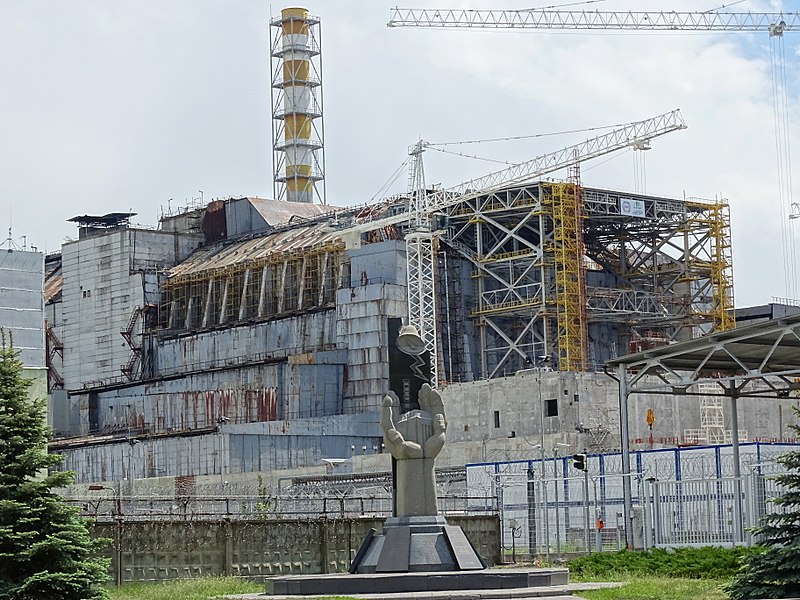
Adam Jones from Kelowna, BC, Canada, CC BY-SA 2.0, via Wikimedia Commons
Some things that will happen in the end times will allow people to carry on as if nothing has happened.
Seven weddings happened in the city of Pripyat (4 km from the nuclear power plant) on Saturday, April 26, a short walk from the burning reactor. And in the months that followed, peasants who were being told to evacuate were challenged with the invisibility of the danger. (A man in a city told his peasant mother in her village, “Mom, look at the bugs and worms in the ground. Are they dying? Then get out!”) In the same way, we need to watch for the signs that Jesus warns us about, signs that may be happening around us today.
Sometimes well-educated officials, who had access to all the true information, just simply did not want to believe what was happening, did not want to believe the words of those who had looked into the pit. There is a lot that has been said about the USSR’s failure to tell what was truly going on. But when we hear the truth, do many of us want to believe it? May God make us ready to believe it.
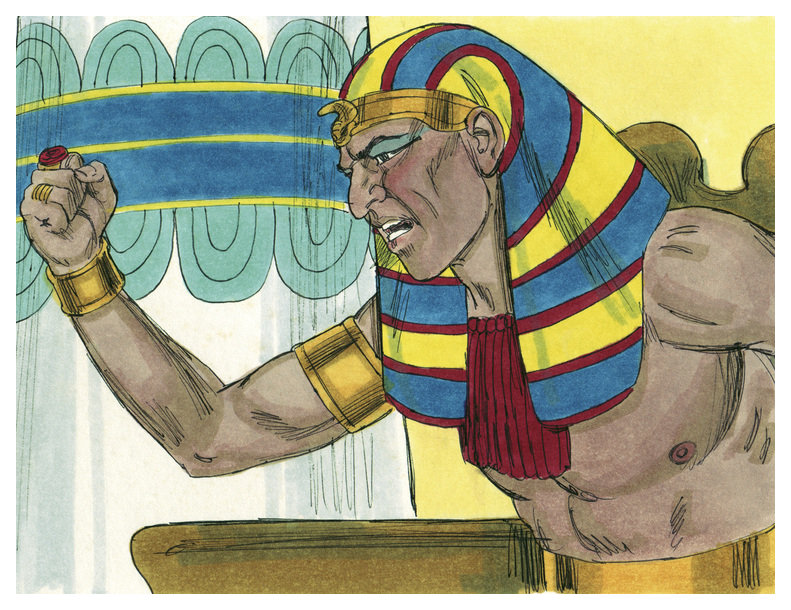
The disasters in the end will not be total, at first.
Like in the plagues in Egypt, there was always a relief, always a chance for Pharaoh to harden his heart again. So it is when God pulls us back from the brink of destruction. (If all 4 reactors had exploded, it could have wiped out human life on Earth.) May God’s mercy lead us to repentance, not toward hardening.
Radiation can melt many things.
It caused spots on the film of young couples’ wedding videos on April 26. The radiation fried the circuitry of the robots that first tried to clean off the roof of the reactor building. It even melted many people’s atheism and disobedience toward God. Plokhy tells about a Communist official defying orders and celebrating Easter with his men for the first time in years, in the wake of the disaster (page 201).
God curses those who curse the Jews.
The town of Chernobyl was 60% Jewish in 1900, a thriving center of Hasidic Judaism (which has since moved to the USA and Israel – those who had not been murdered, that is). Pogroms, Holodomor, Holocaust, etc., reduced their numbers severely in that place. God’s special people will factor large in what happens in the End Times, and God will curse those who curse them.
Often our first reaction to end-times prophecies is to think that they are “fantastical,” “unbelievable,” and “unrealistic.” I believe that God gives us events like the Chernobyl disaster to warn us that these things are not unbelievable, or even difficult to believe. What is difficult to believe is that peace and safety will prevail.
Because of the Lord’s great love we are not consumed, his compassions never fail, great is his faithfulness (Lam. 3:22-23).
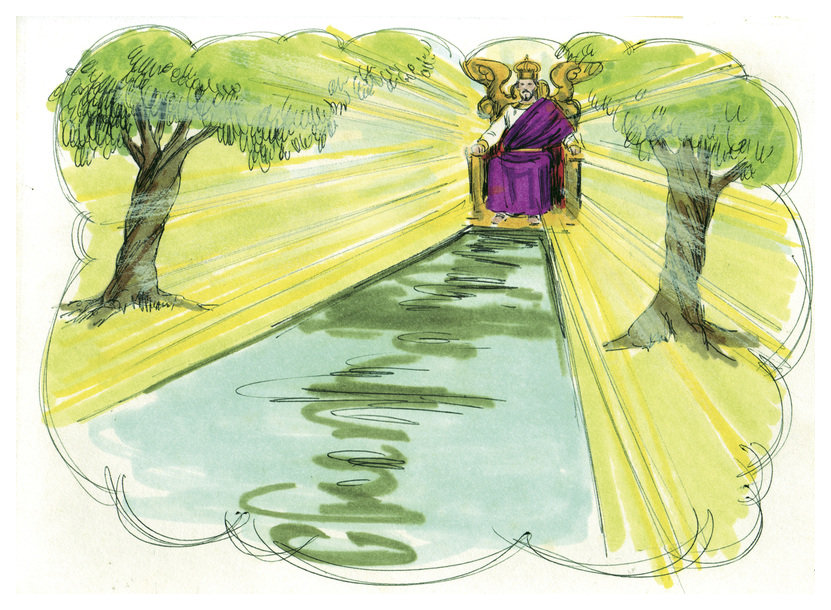
Distant Shores Media/Sweet Publishing, CC BY-SA 3.0, via Wikimedia Commons
John the Baptist and many others struggled to understand Jesus because they struggled to understand that God would come in mercy before he would come in judgment (and he will come in judgment). The purpose is for us to repent and turn to him while there is time. The reactor was out of control, and God held it back from the disaster that it could have been. KGB documents have since been declassified, to show us how often other terrible things almost happened there. Do you have any idea how many disasters God and his angels are on purpose holding back right now, just to give you a chance to turn yourself, heart and soul, to Jesus Christ who died for your sins?
And please don’t assume that this story about Chernobyl and Wormwood is over. Chernobyl is currently in a war zone, and there have been times in the past year when we have gone to bed wondering what was going to happen at that nuclear power plant, or at other nuclear power plants. We are still wondering.